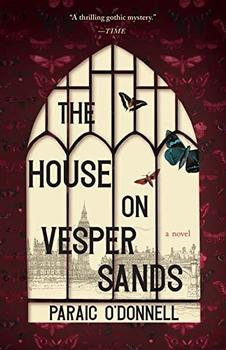Summary | Excerpt | Reading Guide | Reviews | Beyond the Book | Readalikes | Genres & Themes | Author Bio

"There now," said Mr. Carew, as they entered the workroom. "All neat and tidy. Whatever else may be said about us, let no one give it out that we keep a slovenly shop. What do you say, Miss Tull?"
Again, he had made the same observation many times, and always in the same words. This time, at least, he did not wait for her response. The workroom was always cold, and he never stayed longer than he must. With a wheezy sigh, he slouched towards the great iron strongbox that stood in the corner opposite the door. Esther watched his movements carefully, taking note of the pocket to which he returned one key before drawing out another.
"You might oblige me by looking away, Miss Tull."
Esther turned her back, since it humoured him to have her do so. She knew by now what was kept in the safe. Mr. Carew had fond notions of his own shrewdness. Perhaps his master did, too, since he was entrusted with so much, but in truth he was often inattentive. She had taken those opportunities that came. She had seen enough.
She stood in silence as he brought the pieces of the gown to the workbench, taking care to give no sign of unsteadiness in her posture. She heard him return to the strongbox, his tread ponderous and shuffling. It would take him three trips, or even four. It was not only the dress that was locked away, but the box of cards on which the measurements were marked. Esther did not know how these measurements had been procured, and did not wish to.
She listened carefully when he returned to lock the safe. The hinges were apt to creak, but she had greased them with oil from the Singer sewing machine, applying only a little at a time. There was a dull clang as he shouldered the door closed, but that could be avoided with gentleness. The hinges themselves made no sound at all.
She turned, hearing him approach the bench again.
"There you are now, Miss Tull." Mr. Carew said this with a small flourish, as if to emphasise some act of benevolence. "You have all you need, I believe."
Esther waited. Nothing must be rushed. There must be no appearance of urgency.
"Thank you, Mr. Carew." Her tone was not curt, exactly, but neither was it courteous. She had repeated the words before her looking glass, adjusting the set of her jaw by degrees, until she was sure of the effect they would have. Mr. Carew was accustomed to her deference, and when he found it lacking he favoured only one form of correction.
He approached her, standing so close that his knees pressed faintly against her outer skirts. His breathing had slowed now, but it was laboured still. She felt it against her cheek. He smelled of plum cake, of must and snuff.
"Is everything to your satisfaction, Miss Tull?"
"Yes, Mr. Carew." She did not soften her voice. Not yet.
"Are you quite sure?" He leaned closer. "Is there something you would like me to put right?"
"Nothing, Mr. Carew."
He raised his hand, and she felt his fingers curl about her nape. "You know you may come to me, Miss Tull, if you want for anything. I will be glad to see to your needs."
Esther raised her face to his, and as she did so she made a small show of distress and contrition. This was all that was required. As Mr. Carew studied her with satisfaction, Esther made a movement he did not detect.
"Forgive me, Mr. Carew," she said. "It is only that I am tired. My sister is unwell, as you know, and I sat with her for much of the night."
"There now, Miss Tull." He turned away, his attention already elsewhere. "We have each our cross to bear. I will leave you to your work. The door must be locked, as always, but you need only knock. I will be at my little station outside the door. Now, that reminds me. Where did I put down my newspaper?"
He had left it on the workbench, almost at his elbow, where he could not have failed to notice it. He waited until Esther picked it up and handed it to him, a small act of reparation that completed her penance. He unfolded it as he crossed to the door, peering at the ghoulish illustration that took up the greater part of the front page.
Excerpted from The House on Vesper Sands by Paraic O'Donnell. Copyright © 2021 by Paraic O'Donnell. Used with the permission of the publisher, Tin House. Copyright © 2020 by Paraic O'Donnell.




A library is thought in cold storage
Click Here to find out who said this, as well as discovering other famous literary quotes!
Your guide toexceptional books
BookBrowse seeks out and recommends the best in contemporary fiction and nonfiction—books that not only engage and entertain but also deepen our understanding of ourselves and the world around us.